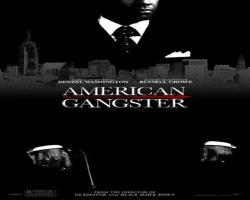Cultural critic Robert Warshow held that the classic movie mobsters were classic Americans forced by their status as the sons of immigrants to seek success and status outside the law. The difference between the gangsters and, say, John D. Rockefeller, was their methods of eliminating the competition was, shall we say, somewhat more strenuous, and ultimately they paid a deadly price for their depredations.
Ridley Scott’s American Gangster depicts the life of such a man, a black drug lord named Frank Lucas (played by Denzel Washington), who cornered the Harlem heroin market in the 1970s, made millions, and was eventually “turned in” by an almost comically obsessive cop named Richie Roberts (played by Russell Crowe). Lucas did some jail time and lost his fortune, but lived to tell, and make money from, his story.
Washington’s portrayal of the criminal is soft-spoken and charming causing the viewer to enjoy his success — which includes the provision of a gigantic mansion for his formerly dirt-poor family.
In the film, the only truly loathsome villain is a crooked cop, Detective Trupo, played with wonderful brutality by Josh Brolin, who encourages us to think the only real crime is to interrupt the smooth flow of criminal entrepreneurship.
Warshow implied we may seemingly worship success in this country, but we also deplore and envy achievement because many of us never attain the degree we hope to. That makes American Gangster, which pursues the minutiae of conspicuous criminality as well as consumption, a more disturbing and seductive movie than its makers may have intended.
How can churches explore the topics of success and compromise with students growing up in a world allured by possessions?
Should youth groups be addressing the glorification of criminals in the media?
How might churches explore the themes of poverty and crime found in the movie?




